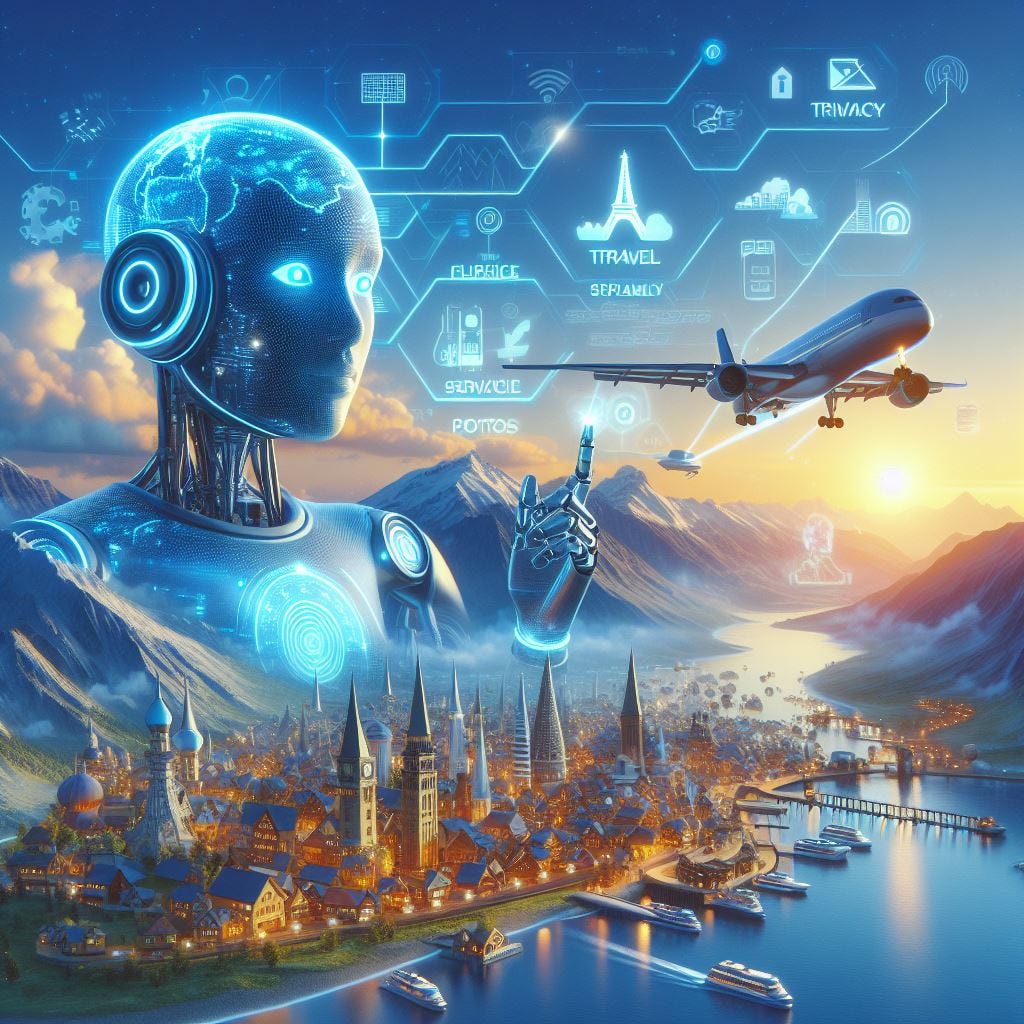AI Transforms Travel, Photos, Service, and Virtual Worlds While Raising Critical Privacy and Scalability Questions
The Latest AI Innovations Bring Convenience and Personalization but Also New Challenges Around Privacy, Practical Implementation, and Controlling How Our Data Is Used
- AI Innovation Transforms the Travel Experience: Artificial intelligence is revolutionizing every aspect of travel, from planning to operations to customer service, according to Trip.com’s CEO. AI tools are driving growth through personalization and efficiency. While offering immense potential economic benefits, AI also raises privacy concerns that will need to be addressed.
- Powerful AI Can Pinpoint Photo Locations, Raising Privacy Concerns: Stanford students developed an AI system called PIGEON that can accurately guess photo geolocations. It highlights how AI is becoming extremely good at identifying subtle location clues. This capability has many positive uses but also raises worries about potential privacy invasions and location tracking without consent.
- TTEC Report Finds Cloud, Knowledge Management, and Conversational AI Critical for AI-Enabled Contact Centers: A readiness survey from TTEC Holdings found enthusiasm for AI is transitioning into demand for practical solutions. Key results show many companies lack the platforms, data quality, and plans to support advanced AI. With proper foundations and partnerships, AI can transform customer experience.
- New AI Tool Holodeck Generates Custom 3D Virtual Worlds from Text Prompts: Researchers created an AI system called Holodeck that automatically builds interactive simulated environments from text descriptions. It accelerates training for embodied AI without extensive manual effort. Holodeck also moves us closer to responsive, personalized metaverse experiences generated on demand.
HEADLIME IS THE GO-TO GPT-3 TOOL FOR MARKETERS.
WRITESONIC IS ONE OF THE BEST ARTIFICIAL INTELLIGENCE-POWERED COPYWRITING GPT-3 TOOLS.
AI Innovation Transforms the Travel Experience
Artificial intelligence is transforming every aspect of travel, from planning to operations to customer service, according to Trip.com CEO Jane Sun. AI-powered tools are increasing conversion rates and customer loyalty by providing personalized recommendations and efficient booking. AI also makes travel smoother via facial recognition for check-ins, robot concierges, and predictive maintenance on vehicles. During the pandemic, augmented and virtual reality offered virtual tours. Looking ahead, AI will focus on highly tailored solutions to individual needs. Sun points to strong recent growth in domestic and regional tourism as driving more innovation. She sees tremendous potential economic impact from elevated Chinese inbound tourism. As AI evolves, it will revolutionize travel by making it effortless, customized, and enriching. The possibilities to transform the travel experience through AI are limitless in Sun's view.
Powerful AI Can Pinpoint Photo Locations, Raising Privacy Concerns
A Stanford student project has developed an AI system called PIGEON that can accurately guess the geolocation of photos with no location data. It was created to play GeoGuessr, an online game where players guess photo locations. The AI beat top human players by studying subtle visual clues. When given personal photos it had never seen, PIGEON correctly guessed locations within about 35 miles. Its capabilities highlight the growing power of AI for both beneficial and dangerous uses. Positive applications could include assessing infrastructure or conservation work. However, privacy advocates worry that governments or companies could use similar AI to uncover and track people’s locations without consent. The students limited PIGEON's release due to such concerns. Experts say AI geographic tagging will only become more widespread. Users may lose control of location privacy as AI can bypass current safeguards like removing GPS metadata. The background of any photo posted publicly could potentially reveal private information about one’s locations or travels.
A survey from customer experience provider TTEC Holdings indicates enthusiasm for AI has now transitioned to demand for practical solutions that can scale. The TTEC AI Readiness Assessment polled CX leaders to gauge AI maturity. Key findings show nearly half of respondents lack confidence in their tech platforms to support AI. Though most aim to double digital interactions, only 36% of current interactions are digital. Under 50% feel their data quality can fuel AI. Over 50% are dissatisfied with conversational intelligence to understand calls. TTEC advises AI success requires a cloud foundation, content accuracy, strategic plans for digitization and linguistics analysis. With proper partnerships and planning, AI can increase revenue, reduce costs and boost loyalty. But hype must transition to pragmatic, scalable implementations.
New AI Tool Holodeck Generates Custom 3D Virtual Worlds from Text Prompts
Researchers have developed Holodeck, an AI system that can automatically create diverse, interactive 3D simulated environments from simple text prompts. Named after the virtual reality chamber in Star Trek, Holodeck builds on open-source 3D assets and leverages AI language model GPT-4 to interpret prompts and generate spatial layouts and code. Given a description like “an arcade room with a pool table,” Holodeck produces customized photorealistic worlds ready for embodied AI applications. Rather than requiring extensive manual effort and expertise, Holodeck allows easy generation of training environments where AI agents can learn. This advances simulated spaces for robot navigation, rescue simulations, and more. Holodeck also moves us closer to responsive, personalized metaverse experiences generated on-the-fly versus predefined virtual worlds.









